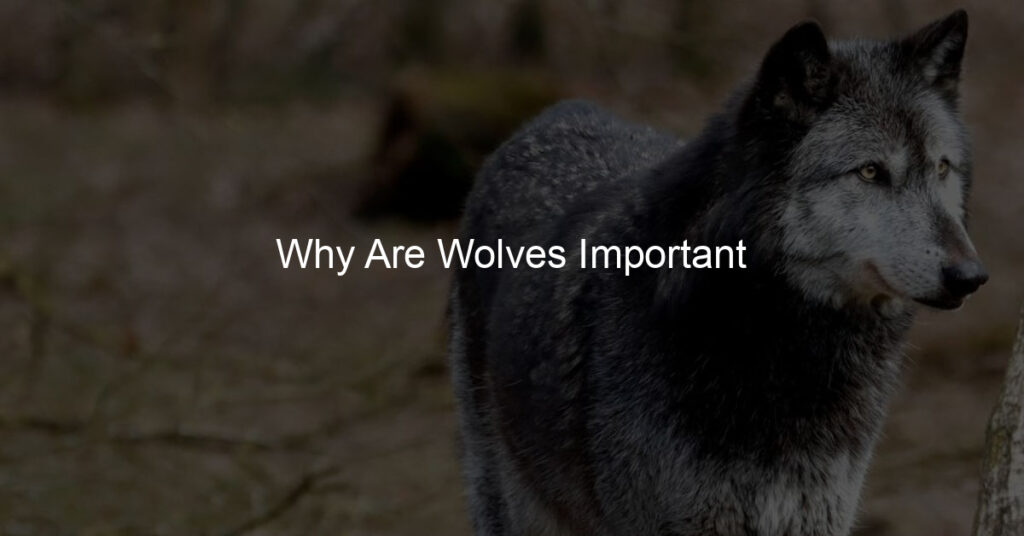Wolves are often misunderstood – they’re seen as dangerous, villainous creatures. But the truth is that wolves are essential to their ecosystems. They play a vital role in maintaining the balance of nature.
In this blog post, we’re going to explore why wolves are so important and dispel some of the myths about these magnificent animals.
Wolf ecosystem
Wolves are a vital part of the ecosystems they inhabit, controlling prey populations and helping to keep our planet’s flora and fauna in balance.
As apex predators, wolves have no natural enemies aside from human interference, so their presence can drastically affect all levels of the food chain. They hunt large animals, like deer, rabbits, and elk, which keeps these species’ populations from getting too big and trampling vegetation essential for other species.
Wolves also reduce the threat of disease spreading through those same herds, since they will usually target the weakest animals. Wolves may not be loved by all people due to predation on livestock but by having them around we can ensure that the ecosystems they populate remain balanced and healthy for years to come.
Why are wolves important to the ecosystem?
Wolves are a vital part of the ecosystem, providing invaluable benefits to the environment. They help maintain a healthy balance of prey animal populations like deer and elk, helping to prevent overgrazing of vegetation and promoting biodiversity.
Additionally, wolves play an important role in controlling smaller predators like coyotes, foxes, and badgers — even scavenging from their kills — thereby keeping smaller predator populations from getting out of control. Wolves also increase the productivity of rivers and streams by preying on beavers that have taken up residence in them.
All in all, without wolves, ecosystems could quickly become unbalanced, resulting in long-term impacts that would be devastating to wildlife.
What would happen if there were no wolves?
Imagine a world without wolves — the majestic animals that keep ecosystems in balance with their natural hunting and culling methods.
Nature would be thrown out of its delicate balance, and as a result, many prey species that rely on wolf predation to control their populations would experience massive population booms. Without wolves to provide healthy competition, many of these species would spread unchecked and eventually cause an imbalance in their habitats.
Furthermore, the removal of an apex predator like the wolf could have catastrophic effects on smaller predators such as foxes and coyotes who have come to rely on the wolves for much of their food supply. All in all, our planet would look drastically different without one of its most important protectors: the gray wolf.
How do wolves change ecosystems?
Wolves are incredible animals with a huge impact on nature. Through the principle of ‘trophic cascade’, they have an essential but often overlooked role in cycling the nutrients and controlling populations of other species within ecosystems.
Wolves hunt their prey, mainly large ungulates such as deer, elk, and moose, keeping their numbers in check. This prevents these species from overgrazing grasslands and maintains healthy vegetation. In addition, wolves indirectly affect other members of the food chain by maintaining more balance between species along with helping to control populations of smaller predators.
The reintroduction of wolves into Yellowstone National Park has been credited with restoring streams, bringing back lush vegetation and even bringing back bird populations! That’s how powerful these creatures can be when their roles in ecosystems are re-established.
Why are wolves bad for the ecosystem?
Wolves are incredibly important in the animal kingdom, but they can be really bad news for other organisms in an ecosystem. Wolves are apex predators, which means they prey on other large mammals like deer and elk that also exist in their habitat.
This can cause huge swings in population levels for these other species as wolves tend to consume a lot more than what is needed for survival. In some areas, this has caused the complete extinction of certain animals like bison and caribou.
The disruption of ecosystems due to wolf predation can cause major disruptions to the food web and even the climate in the area if left unchecked.
Do wolves destroy ecosystems?
Wolves are powerful and iconic creatures, with their presence on the landscape having a large impact. But do wolves destroy ecosystems?
On the lighter side, they may be seen as taking a bite out of our picnic lunch or snatching up our little pooches like they were pups in the pack but to really answer this question we have to look beyond the surface. Wolves typically target weaker species such as old, sick, or young animals, thereby promoting overall health among their prey – in turn helping other species in the process.
Wolves also indirectly affect entire habitats by altering grazing patterns and vegetation, providing food sources for many small plants & insects. In reality, wolves can help maintain a healthy ecosystem when balanced well with their habitat.
The Bottom Line
Overall, it is clear to see why wolves are an incredibly important species in the world’s ecosystems. They justly deserve their nicknames of “the chief and monarch of the wilderness” and “the living link between vast nurseries of life”. Moreover, seeing their relationship with their ecosystem helps us to understand more about our relationships with the environment around us. It is not only vital that we protect wolves and other species today, but also strive to understand how they benefit our own lives in a broader sense. If we appreciate and learn from wildlife, then everyone can have a better future full of diversity, balance, and life-sustaining wisdom belonging to responsible individuals.








